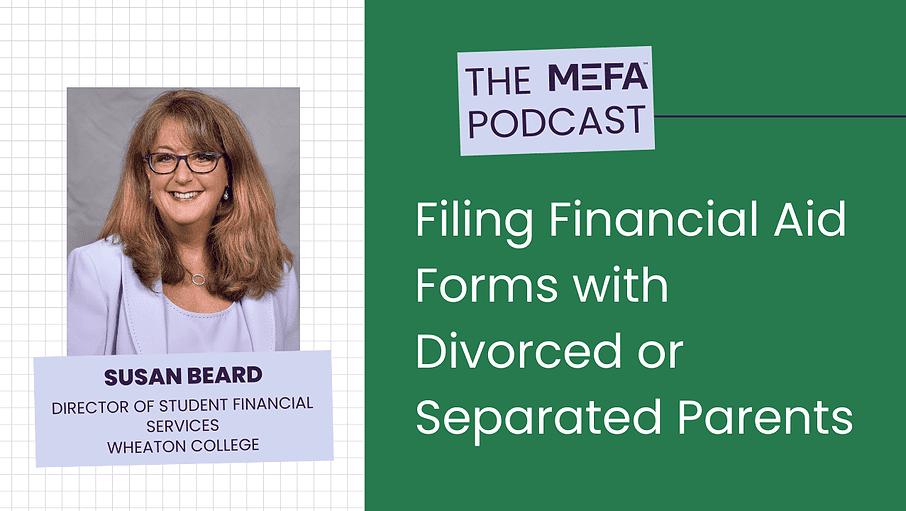

Resources Mentioned in this Episode
Please note that this transcript was auto-generated. We apologize for any minor errors in spelling or grammar.
Jonathan Hughes: [00:00:00] Hey everyone, welcome to the MEFA Podcast, my name is Jonathan Hughes, and today we’re going to have a different type of episode than we typically have on the show. You are going to be hearing a conversation between me, Julie Shields-Rutyna, and Director of Student Financial Services at Wheaton College, Susan Beard, and she was our guest previously on the show a few years ago, talking about the same topic that we’re going to be talking about today, which is filing financial aid forms for divorce for separated parents, which was our, it is our most popular podcast episode. We knew it would be very popular because it is a question that we get dozens of times every year. My wife and I, my husband and I are separated. We’re divorced. How do we file the financial aid forms? We are going [00:01:00] to be doing this again this year because the answers to those questions are different. The FAFSA has changed their methodology and their practices for who files and how they file. So we’re going to be talking about that. As always, you can reach out to us with any questions you may have on planning, saving, and paying for college over email at [email protected] over the phone you can contact us at 1-800-449-MEFA and on social media. You can contact us on Facebook at @MEFAMA, on X at @MEFATweets, and on Instagram at @MEFA_MA, remember we have a bench of college guidance experts. that are waiting to answer your questions. Now let’s go to our conversation with Julie Shields-Rutyna and Director of Student Financial Services at Wheaton College Susan Beard about filing financial aid forms for divorced or separated [00:02:00] Susan Beard is the Senior Director of Student Financial Services at Wheaton College in Norton, Massachusetts. Graduating from Wheaton with a degree in economics, she began her career as a financial aid counselor at her alma mater, thinking it would be temporary. Almost three decades later, she’s now overseeing financial aid, student billing, and accounts, and student employment at Wheaton. Her two children are now in graduate school, and her FAFSA submission days are behind her. Congratulations. She still enjoys helping students and families navigate the admission and financial aid application processes, as every year brings new and exciting changes, and that’s certainly the case this year. Welcome back to the show, Susan.
Susan Beard: Thanks so much for having me. It’s always, it’s always so much fun. Thanks.
Jonathan Hughes: And of course with us to talk about this as well, our co host who needs no introduction, Julie Shields-Rutyna.
Julie Shields-Rutyna: And always happy to be here on in whatever capacity.
Jonathan Hughes: Now, before we get into the [00:03:00] topic of, you know, divorce, separated parents, I feel Susan, like I’ve got to hear, in this crazy time in a unique year, right, because the FAFSA is delayed this year and everything’s different on that angle.
So tell me how is Wheaton dealing with the, the late FAFSA this year? And so when families are contacting you, what are they asking about? How are they dealing with it? Do you have people who are applying early? If you have early action, early decision students, what’s the process that they go through this year?
Susan Beard: We just, within the past two weeks, Wheaton has decided to have an opportunity for students and families who are applying early decision or early action. For admission, we have this decision every year. They hear about their admission decision and financial aid package before the holidays. Of course, without the FAFSA being available, this presented a challenge.
We are not a CSS Profile® school, so we don’t use that application to [00:04:00] determine financial need. So we designed our own application and we have our own calculator based on the new student aid index calculation. So when students apply early to Wheaton, they have an opportunity to fill out this online form that mimics the FAFSA with the understanding that it’s going to be an estimated award until the actual FAFSA is available and we think January at this point.
Jonathan Hughes: Oh, okay. So that’s a that’s the first I’m hearing about January.
Susan Beard: Well, we’re being very conservative with our families just saying that You know more than likely available December 20th. And then all of the, a lot of the colleges are closed for the holidays. So it’s just easier to say January.
Jonathan Hughes: That makes sense. Oh, that makes sense. Yeah, that makes sense. So, okay. So you- the net price calculator has been updated and you’re having a student’s work through, through that process to get an idea [00:05:00] of what the financial aid offer may be.
Susan Beard: Not our official net price calculator. It’s a, it’s a more detailed version of an application that only applicants can access. Through an admission portal to be technical, but yeah, well, we feel really confident that it’s a very very good similarly to the FAFSA questions and the formula so that families will have a really good idea of of what they’re eligible for.
Jonathan Hughes: And what else are you hearing? Are families stressed about this?
Susan Beard: You know, I think new families coming into the system they don’t know or they don’t remember or haven’t even been aware that the FAFSA has always been available. Well, not always. For the last 10 years, it’s been available in October. So for many of them, it’s, it’s not.
As big of a change for the rest of the aid or colleges world families that have multiple children in college. And that’s a whole other topic we could go into. They are more aware and more nervous. So we, you know, we [00:06:00] have a lot of our current enrolled students, families calling and saying, what’s going to happen next year.
You know, I usually have applied by now. I get a discount for having two in college or my, my contribution is lower. So what’s going to happen? The new formula doesn’t account for that. So that is creating a lot of stress more so than the delay and the deadline. Families, I don’t think mind the delay in the form.
It’s more the college communities and processes, processors that are we’re going to have a very condensed processing season and in the late winter, early spring for sure.
Jonathan Hughes: So last time we were all together, we talked about this topic. As I mentioned before, it’s a different year. The actual information, the process is a little bit different.
It’s changed. But before we get to talking about what has changed maybe we should talk about what hasn’t changed. So, in general, how divorced or separated parents [00:07:00] should, like I said, in general, approach this process, the financial aid process. What should they keep in mind and what spirit should they do this?
Susan Beard: Sure. Do you, Julie, do you want to? Talk about that a little bit.
Julie Shields-Rutyna: Well, yeah, you know what I, I have a, just a couple of things to say, Susan, and then I want to hear how you think about this too. But I guess one thing that I like to say to people is, of course, there are so many circumstances and everyone’s family is different and every people’s relationships are different, but just because parents are divorced doesn’t necessarily mean that that has to make this process more difficult. I think there’s that idea that it is, understandably, but I just want to share that working in this field for so long, I’ve talked to a lot of married parents about the college process, and so often people have different [00:08:00] ideas about what they want for their kids when it comes to college, you know, maybe one parent went to a private institution and one went to a public institution and they both feel strongly one way or another about those decisions or one parent’s may have received help from their parents and another may have not.
And they feel strongly about how that affected them. And they, they bring that to the college process with the kids. So that happens even when people are married. And so when, when people are divorced. Yeah, it feels like you want to get a little bit on the same page and that can be more challenging, but it’s not uniquely challenging to divorce families.
So I think one really key important step if, if possible, and I know this is can be easier or more difficult in different circumstances is if parents can get together kind of as early as possible and [00:09:00] just try to have a couple of conversations about all of this and with their students and without their students.
So that that people can sort of come to some understanding of how this process is. going to go. And then the same advice that we give to all parents, which is keep an open mind. The key is wanting to have the students have a group of schools that they are excited about applying to, and then seeing what financial aid you know, is offered from those institutions and then making, you know, a good decision on where to go.
So, some of that is universal to all parents. I guess just making sure those conversations happen between parents who are divorced or separated could, could be a little more challenging.
Susan Beard: Absolutely. You know, I think when, at the college level, when we speak with parents who are [00:10:00] separated or divorced and Julie awesome point about married parents too.
Sometimes philosophically, they’re not on the same page. So we, we do go a little extra mile to assure separated or divorced parents that. Their student is of utmost important, their child, right? The process is all about their child. And by filling out forms that are requested by the college, it’s not obligating them to pay anything.
It really is just, it’s, it’s necessary to determine the most financial assistance that, that their child can get. The other question. So, so that’s 1 question. You know, I don’t want to pay. So I don’t want to fill out the form. Well, we’re not telling you to, which is we need the information. The other, the other 2nd, I guess, most.
Biggest concern that we hear about is confidentiality and the intermingling of finances. Some families that are divorced or [00:11:00] separated or are wide open with their and willing to share others, as we all know and understand, like to keep things separate. They separated for a reason and we respect that.
The whole process is designed to be very confidential. Finances are separated. And it’s just really important that communication keeps or starts early and continues along without throughout the process. Again, all geared towards the benefit of the child.
Jonathan Hughes: Now I do want to talk about what is different this year.
So the FAFSA, as we said, it’s not out yet, but when it does come out, there are changes for divorced or separated parents. Susan, I wonder if you could tell us what is going to be different this year.
Susan Beard: Sure. So traditionally it is the custodial parent. It’s defined as the parent who, with whom the student resides most of the time.
That’s the easiest way to describe how it used to be. Now the FAFSA is [00:12:00] asking for the parent to be the main, the main contributor or parent of the student is the one who provides the most financial resources. So that may or may not be the parent with whom the child resides.
Jonathan Hughes: And then people, yeah, and then people always ask, it’s, it’s, it goes to taxes, right? Who claims child on the taxes, right? And is that, is that what it is?
Susan Beard: No, it is not. As many families who go through a divorce make arrangements on their tax returns, one year they’ll claim the child and the next year the other parent will claim it. And so it’s not necessarily, doesn’t necessarily mean that’s where the kid is living with, with, with that parent So the definition now is the parent who provides the most financial resources always filed up followed up with a question from our families.
Well, my child splits their time 50/50, you know, or sorry, it’s not the time anymore. It’s the, it’s the resources we both contribute 50/50. So you do need to [00:13:00] try, or the families need to try to figure out which parent provides the most financial support, and it’s defined as income or assets right now.
But there’s been an outcry from the aid community to better define that on the FAFSA as it’s going to print in the next, or print so to speak, it’s going to be online. Within the next few weeks to say whichever parent has the most income and assets so that it’s a little more defined because we, we had families that say, well, he makes more income, but I have more assets.
So how do you figure who is more of a financial contributor? So it gets very, very tricky. Julie alluded to the fact that no two situations are alike. And you know, that’s where our resources come in. Your resources come in when families are. questioning or just really aren’t sure what to do. They can seek advice and talk with somebody.
If I find parents feel so much better just by [00:14:00] having someone tell them what to do or which person to use. And, and going through the process myself and Julia, I’ll speak for you as well, if you don’t mind, I think we’re extra sensitive to, to scenarios like that. And the extra few minutes that we can give to families that are, that are separated or divorced or living apart, living at different parts of the country, different countries, no two are alike, our biggest goal, financial aid administrators and any kind of college advisors is, is to make the process as stress free as possible and as quick as possible.
So deadlines aren’t missed. We don’t want to belabor. So that’s, you know, I think that’ll be the biggest challenge is just trying to figure out which parent to use on the FAFSA itself. As far as the CSS Profile, Julie, I don’t know if you can. Talk about that if it’s similar.
Julie Shields-Rutyna: Yeah. So [00:15:00] and with the CSS Profile® the question now is going to mirror the FAFSA a little bit more. So they’re asking the student to choose the parent who provided more financial support. And that would be. You know, that parent on the CSS Profile®, but what we know about the CSS Profile® is that they actually then ask, they ask more questions about the parent situation, what, what other parents are involved.
So then schools that use the CSS Profile will have that, you know, the one parent of record, but the student will also say, who’s the other parent. In many colleges that use the CSS profile will ask that parent to then go in and fill out a I won’t call it a non-custodial profile, right? I’ll call it another parent profile at this point because sometimes colleges that use the CSS profile will want both [00:16:00] parents to complete that.
So with the CSS profile, usually both parents end up completing a, you know, a separate profile. The one of record completes it with the student, and then they send an email to the other parent and say, now can you complete your separate form? Both of those get completed, but hopefully that will, the choice of who that first parent is will mirror then what they choose on the FAFSA.
Jonathan Hughes: What about if the parent who files, whoever that is, has remarried?
Susan Beard: Yes, I neglected to say, a remarried parent does need to include their spouse. Regardless if they file taxes married, filing separately. Regardless if there’s a prenuptial agreement that says you pay for your kids, I pay for mine. It doesn’t matter.
Parent or a step parent or new parent or however you want to frame it does need to be included. Probably that’s [00:17:00] one of the biggest mistakes or errors we find when, when families are divorced, separated, they, they figure out which parent to use and they seem to forget about that new parent or step parent.
Again, you know, and it’s not always intentional. It’s they have, you could be married, but have two separate families and, and or your kids have already gone through college. And so you figure you’re done. So your new spouse is responsible for their children. So it does get very tricky. And even as we’ve talked about this for years and years, I still get confused myself as I’m trying to explain it. So it’s no wonder that people get stressed about it.
Jonathan Hughes: And Susan made the great observation that a lot of times people just want us to tell them which parent to use. But there is thought behind that sort of ambiguity from the, from a policy standpoint, right? Because Department of Education, they want this to be a decision that the family makes. Is that right?
Julie Shields-Rutyna: Yeah, that, that really is true [00:18:00] because we’ve seen a lot of ambiguity and we’re hoping for a little more clarity on pieces as Susan mentioned, but on that first question that a family would get, which is. or that a student would receive that says which parent provided more financial support in the last 12 months.
They’ve left that financial support somewhat vague because they want the students to really be able to answer that of, you know, who is the parent? Who’s paying for me to, you know sleep and eat and you know, there might be a parent who’s doing a little more of that than the other parent.
And if that’s the case, then, then that the student can choose that parent. That’s their parent who’s involved in a, in a financial way, you know, and, and has been over the last 12 months. So if the student can answer that question, if that feels very clear to them. Good answer that and then that sort of makes it easy to know who the parent of record is there.[00:19:00]
But if not, if, and there are many situations and I, I do know this situation. Well, personally, if it is, the student says, no, both of my parents are equally involved in financially supporting me. Equally, which is hard to say because, you know, to the penny, usually one will be supporting a little bit more, but if they, they say, no, it’s 50/50 and check that box, then the advice and guidance that the FAFSA will say is then choose the parent with the higher income or assets.
So then it’s very clear they have to choose the parent. With the higher income or assets. So in a way, I think it can sometimes be easier if you, if, if the first question seems like a no brainer, go with that. If not, if you get to that then you’re really choosing the parent with the higher income or assets.
Maybe that’s easy. Maybe that’s known or as Susan said, even that’s ambiguous. And [00:20:00] so It’s still leaving a little room for guessing and we’re hoping on that one to have some more clarity by the time the FAFSA comes out.
Jonathan Hughes: I think that, you know, the earliest question that people are going to run into in terms of the FAFSA is, FSA IDs and who needs an FSA ID and just to back up before you start your FAFSA, you should get your FSA ID and the student needs one and then at least one parent would, right? So in the cases of divorced or separated parents or even just in every case, which parent Susan would need to file an F- would need an FSA ID.
Susan Beard: So the FSA ID is really now attached to tax information. So if you are a student and your parents are married, living together seems very straightforward. And if they file jointly, then only one [00:21:00] parent or contributor to the FAFSA needs an FSA ID. However, if parents are filing, married filing separate, so there are two separate tax records, then both parents will need an FSA ID.
That’s my understanding. Julie, do you agree with that?
Julie Shields-Rutyna: Absolutely. Absolutely.
Susan Beard: It’s Jonathan, as you know, and Julia, things are changing by the week. Definitions are changing. So that’s my grasp on it at this very moment.
Julie Shields-Rutyna: Well, yeah, and I’m going to say that maybe we can attach these to the show notes.
Jonathan, because we just created some great colorful cheat sheets because this FSA ID question is so complicated. So maybe we can put them in the show notes. And so then I guess I’ll add Susan on top of what you said, that’s exactly right about the filing jointly filing separately. So let’s say it’s a divorced or separated parents who are [00:22:00] divorced or separated.
Then If the parent of record, I’m going to keep calling them that, who’s going to be the contributor on the FAFSA is single, then that parent would need an FSA ID. If that parent is remarried, so there’s a step parent involved if they filed jointly, it’s still just one parent who needs an FSA ID, but if they filed separately.
Then two parents that need an FSA ID. So it might be better to look at these wonderful cheat sheets. Because talking about it gets so complicated.
Jonathan Hughes: I’m going to throw in another curveball here, last question, just to make it really annoying. What if the student is married?
Julie Shields-Rutyna: Yeah, it’s the same thing. So if the, if the student is married, if they file jointly, then it’s fine to have the one FSA ID, but if they file separately, they’ll need two. Isn’t that right, [00:23:00] Susan?
Susan Beard: Yeah, it is right. And before Jonathan thinks of another curveball, I’ll just catch it or even throw it if a parent who is divorced or parents are divorced, but in the tax year that we’re asking for is is now going to be. the year 2022, they may have been married in 2022 and filed jointly.
So that makes another layer of trickiness. I’ve been, I I’ve read, and this is my interpretation that that if that’s the case, then the data transfer is not able to happen. And, and the newly divorced parent of record will need to manually put in their income information on the FAFSA. It won’t be able to take advantage of the it’s not the transfer from the IRS.
Jonathan Hughes: That’s really good to know because I’m not sure if I knew that to tell you the truth. Now I have another question about this is cause there’s another layer to this, right? And that is [00:24:00] there’s FSA ID, but then there’s consent. You have to electronically consent because as you mentioned, okay, so this process is you’re going through the FAFSA, you’re filing it.
All the right people have their FSA IDs and everything, and you’re filing your FAFSA. And then it comes to the question about parent income. And what they ask is if. You know, you can, if the FAFSA will, if you will consent for the FAFSA to go into the IRS, pull in your tax information and populate it.
And so even if you haven’t filed, you have to give consent, right, for them to be able to go in and do that and sort of verify that you have or haven’t filed. What about that piece of it?
Susan Beard: This is really new, new and cutting edge, sort of. Whereas before, parent, student, both have an FSA ID, you could sit at the computer and do the form together, both electronically sign and off [00:25:00] it goes.
Now, the steps are a little bit different in that the student begins or starts the FAFSA with their own FSA ID, and then they invite contributors or contributor to also add their information. I’m I really am nervous that this may hold up processing quite a bit. But the government is. Keeps telling us it’s going to be simple.
Simplified it will get tricky. And I, I don’t mean to jump ahead, but while I’m thinking of it, I, I’m very worried in my fellow aid administrators are worried in that when a student starts a FAFSA, if the contributor that they’ve invited does not. Comply or add their information within 45 days. The FAFSA disappears and they have to start from scratch.
So, you know, I I don’t know if I’m hungry or not, but when you talked about all the many layers, I just thought of this whole process is baklava. Like, there’s just so many thin, thin, thin layers to get [00:26:00] through. In the end, it’s a delicious dessert, and it will pay off. But but there are so many layers, and those nuts in between might create a few hurdles.
Julie Shields-Rutyna: Susan, I love it. I’m going to steal it. I love it.
Susan Beard: Can you answer the question? I’m not sure I answered the question.
Jonathan Hughes: Yeah, the question, I mean, I think it’s already been answered because if there was a divorce in the year that they’re pulling information from, there would be no need to consent because You have, you, you’re not consenting to having your information pulled from the IRS if you’re not a contributor, and this information has to be listed. Is that correct?
Susan Beard: Yes, exactly.
Jonathan Hughes: Okay, so that’s, that’s good. I’m learning along with everybody else here. This is nice. So,
Julie Shields-Rutyna: Can I, can I [00:27:00] add one more Yeah. piece of information?
Jonathan Hughes: Please do.
Julie Shields-Rutyna: Because we talked about, you brought it up, Jonathan, about different parents claiming a student on their tax return. And where that fit in and we said that it doesn’t fit in right here where we’re talking about it, but I will just say that in this new process, which is going to be heavily, heavily reliant upon that IRS data coming right into the FAFSA and making the actual form much simpler.
That’s wonderful. The family size. Is going to be pulled from that tax return automatically into the FAFSA. So if the contributing parent you know, is claiming that student or not claiming that student, that’s the family size that will get pulled in. But, on the FAFSA, the family always has the chance to just adjust that family size and put in the correct family size [00:28:00] for the year and that that will just be a self reported piece.
So they just have to pay attention and know, wow, if I’m the contributor, but I’m not claiming the student this year, it may look like my family size is lower. I’m going to put in the exact correct family size on the FAFSA.
So that’s a great point because your family size It does impact your student aid index, which is basically setting how much financial aid you’re eligible for, right?
Yeah. Yes. So that’s the drizzle of honey on the, on the baklava, Susan, just to add another layer.
Jonathan Hughes: Okay, so let me ask, I can’t think of another baklava analogy, but let me think, let me have a follow up question for that, right, because it’s my understanding that you don’t see the information that’s pulled over from the IRS, right? [00:29:00] You just have to know. You just have to know. So is it our advice then that everybody just goes and puts in for divorce to separated parents that family size information?
Without checking if they have it correct to fill it in
Susan Beard: Definitely, I’m not even sure Julie if it allows you to leave it blank anyway. So it might be a forced question that they have to answer. It may be a challenge on the on the receiving side. The colleges may need to then reconcile if the family manually reported five in the household, but the tax return only says three, it may be a challenge for us to try and reconcile that and know which figure to go with, but we’ll cross that bridge when we come to it.
Jonathan Hughes: Well, I think that’s a good point too, of crossing bridges when you come to them, because I think I can just imagine families sort of. Hearing [00:30:00] all these questions and not knowing, you know, what they should do next. I think it’s a good time to reiterate two basic points that we always make. And Julie’s going to laugh because she always knows what I’m about to say when I say this.
But if you have questions to follow up with the financial aid office, right. And then also to submit something by a deadline.
Susan Beard: Absolutely. You know, we tell the students in college, don’t procrastinate. Don’t delay. It’s not going to go away, but it’s like the same goes for family. Same goes for me in my everyday life.
You know, the more unpleasant things I may tend to put off and especially if I’m filling out a form that I don’t really even understand. It’s much easier to put it aside for the next day. The good thing about this FAFSA form is it’s. It’s fluid to a degree. You can always log back in and update some of the answers, not the tax return data, because that’s the data.
But there’s always an, and financial aid administrators always have the ability to, to take your data [00:31:00] and and I don’t want to say manipulate because that’s, that’s negative, but update.
Jonathan Hughes: I want to ask one more question before we go. And Julie, it’s about the CSS profile. We talked briefly about the CSS profile earlier on.
But in the cases of divorced or separated parents, I know it’s a bit different as you mentioned for the profile. What if, because I always like to, to mention this, in the cases of divorced or separated parents for CSS profile if there’s a situation where there’s no contact between ex spouses what is that process like for these families? What should they do?
Julie Shields-Rutyna: Yeah. So, you know, this does come into play with the colleges that require the CSS profile because they like to have that other parent information, but all of those colleges know That sometimes that other parent is, you know, is not around and there’s no relationship and it’s hard to get in touch.
So, in those [00:32:00] cases colleges all have a non custodial parent waiver form or a waiver process. So, you could probably look on the financial aid section of the website of colleges that require CSS Profile and probably find the form, or if you can’t, be in touch with the college and just ask for a. Waiver form for that and complete that and send that in with the financial aid application because yes, we we run across that situation often.
Jonathan Hughes: I just wanted to ask if either of you have any advice from your own personal experience to give to, to parents that are, are going through this process?
Susan Beard: Oh, I was very fortunate in that my husband was willing and we were, we were on the same page about getting forms completed being in the business. He very happily handed most of the process over to me.[00:33:00] And, you know, when things needed to be confidential, I showed him how to do things and when they didn’t.
You know, we had two, two children go through the process. So at the very beginning, it was a little touch and go, but then after year after year, it did get a little bit easier. And I was, I just feel very fortunate that, that we always had the kids in mind for, you know, put that above our. own little situations.
But I know that not every family is like that. And so when we counsel families at Wheaton and everywhere, I think aid administrators are very sensitive to the fact that Students may be uncomfortable sharing their parental situation. The parents may be angry at each other. They I think communication is key and just making the parents feel so comfortable that things are confidential and we’re here for the student and we don’t take sides and we don’t [00:34:00] make anybody pay.
That’s been my M.O., anyway, it’s just making families and again, I will disclose to families that I’ve been there. And so even just hearing that makes them feel maybe a little less stressed.
Julie Shields-Rutyna: Yeah. I agree with you so much, Susan. And I agree with you that we’re in kind of a unique situation where, because we do this for a living you know, my ex husband also.
You know, was looking to me for the guidance on it, which I think wouldn’t necessarily happen in other situations. But what I would say is sort of the, the families that I see that come to me as sometimes will come to me, maybe even junior year. And they’ve come upon a difference, as I said, where, you know, one parent thinks the students should go to UMass, because he or she went to UMass, and the other parent is looking at a variety of other colleges, and so when they come to [00:35:00] me, it’s almost as if they want to, they want to solve that problem right then and there, because they’re at a, they’re at a disagreement early on in the process, and so I would encourage people to say, that doesn’t have to be solved early on.
It’s all about keeping that open mind, helping the student create a college list of a number of places, a balanced list, so that it’s a number of colleges public, private, large, small, affordable, questionably affordable, you know, putting it all together so the student has a great list and then just make a decision as a family that you’re going to collect all that information.
You’re going to look at all that information very closely together, if possible, and make a decision that is good for the student as far as academics you know, [00:36:00] geography, social, social pieces, all of that, and affordability but that, that final decision doesn’t have to come until, you know, Mid-April of senior year, and so if you can really just work through junior year, the summer after junior year into the fall as a building the best options for the student, and then there will come a time for that critical decision, but it doesn’t have to happen before the whole process has even started.
Jonathan Hughes: Well, all right, Julie. Susan, thank you so much for being here. This is very educational. Hopefully we’ll do it again soon. Thank you, John. Enjoy your baklava. All right, everybody. Well, I hope you enjoyed that. I want to thank Julie and Susan for being here and sharing their expertise with us and their experiences.[00:37:00]
And remember, folks, if you liked what you heard on the show today and you want to know more from MIFA about planning, saving, and paying for college and career readiness, Well, then you can follow the show and you can follow us wherever you get your podcasts and please remember to review us Because it really does help us to keep doing what we’re doing putting the show together and getting it out in front of folks So I want to thank once again, Julie Shields Rutina Susan Beard, I want to thank our producer Shaun Connolly, and I want to thank AJ Yee and Lauren Danz For their assistance in getting the show posted so everyone can hear it.
Once again, my name is Jonathan Hughes and this has been the MEFA Podcast. Thank you.













